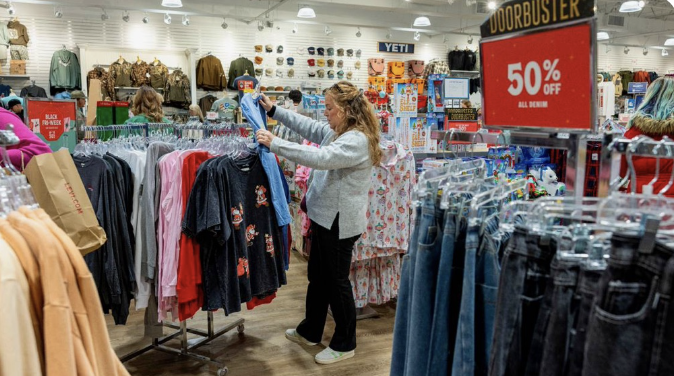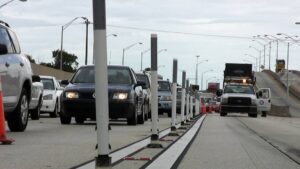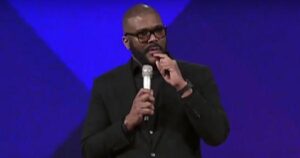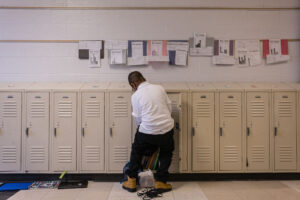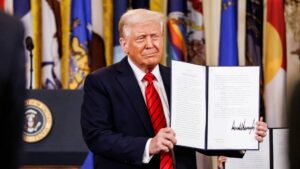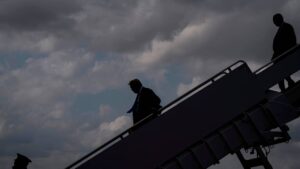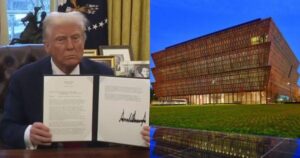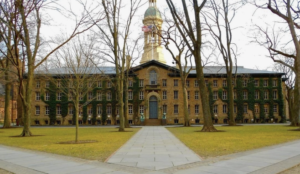By Alan Rappeport NYT News Service/Syndicate Stories
WASHINGTON — President Donald Trump’s sweeping tariffs are expected to raise the cost of cars, electronics, metals, lumber, pharmaceuticals and other products that American consumers and businesses buy from overseas. But Trump and his advisers are betting that they can sell an inflation-weary public on a provocative idea: Cheap stuff is not the American dream. “I couldn’t care less if they raise prices, because people are going to start buying American-made cars,” Trump said on NBC’s “Meet the Press” show Sunday in response to fears of foreign car prices spiking. The notion that there is more to life than low-cost imports is an acknowledgment that tariffs could impose additional costs on Americans. It is also a pitch that the burden will be worth it. Trump’s ability to convince consumers that it is acceptable to pay more to support domestic manufacturing and adhere to his “America first” agenda could determine whether the president’s second term is a success or a calamity.
But it is not an easy sell. The onslaught of tariffs has roiled markets and dampened consumer confidence. Auto tariffs that go into effect Thursday will add a 25% tax on imports of cars and car parts, likely upending pricing in the sector. Trump has already imposed tariffs of 20% on Chinese goods, and more are expected later this week, when the president announces his “reciprocal” tariffs on major trading partners, including those in Asia and Europe. In confronting anxiety over the trade uncertainty, Trump and his top economic aides have resorted to asking Americans to think about the bigger picture. They espouse the view that Trump’s trade wars are necessary to correct decades of economic injustice and that paying a bit more should be a matter of national pride. “We may have, short term, a little pain,” Trump said last month as he unveiled tariffs on Canada and Mexico. “People understand that.”
Treasury Secretary Scott Bessent put it bluntly earlier this month when he pushed back against the idea that inexpensive products should be what Americans aspire to have. “Access to cheap goods is not the essence of the American dream,” he said in a speech to the Economic Club of New York. Bessent, a former hedge fund investor who is worth hundreds of millions of dollars, underscored that point in a follow-up interview on NBC, arguing that prosperity is not about buying “cheap baubles from China.” “The American dream is not ‘let them eat flat screens,’” he said, arguing that it is instead about having good jobs that are not lost to foreign competition and wages that are high enough to afford homes. The comments renewed a debate within the Republican Party over the merits of trade barriers that in recent years has sidelined traditional conservatives who prize free trade. Former Vice President Mike Pence shot back at Bessent, asserting on social media that the Treasury secretary misunderstood the aspirations of Americans.
“Tariffs are good as a means to bring nations like China to the table, but free trade lowers the costs of goods and improves the quality of life for every American,” Pence wrote on social media platform X. Concerns about China’s economic practices have unified Republicans and Democrats. But they remain divided on the best approach to combating Chinese excess industrial capacity and its dumping of cheap goods around the world. While the Biden administration attempted to confront this dynamic with targeted tariffs and federal subsidies directed at clean-energy technology and semiconductors, the Trump administration is embarking on an industrial strategy built around broad-based tariffs and tax cuts. But the haphazard rollout of the tariffs and the fact that any changes to the tax code will not occur until later this year have left economists, trade experts and analysts wondering about the viability of Trump’s strategy and doubtful that his administration can convince consumers that they are better off with higher prices.
“My bet would be that people will not be willing to swallow higher prices, lower 401(k)s, lower wealth in exchange for the principle of a nationalistic economy,” said Stephen Haber, a professor and senior fellow at the Stanford Institute for Economic Policy Research and the Hoover Institution. “Reality tends to trump ideology for most people.” Haber recalled that in the 1970s, President Jimmy Carter appealed to Americans to embrace austerity as the nation tried to combat inflation, and it proved difficult to entice the country to embrace self-imposed hardship. Economic pain was unpopular, and Carter only served one term. To skeptics of Trump’s approach, the tariff drama appears to be an emergency of the president’s own making.
Read more at: https://www.miamiherald.com/news/business/article303175321.html#storylink=cpy

